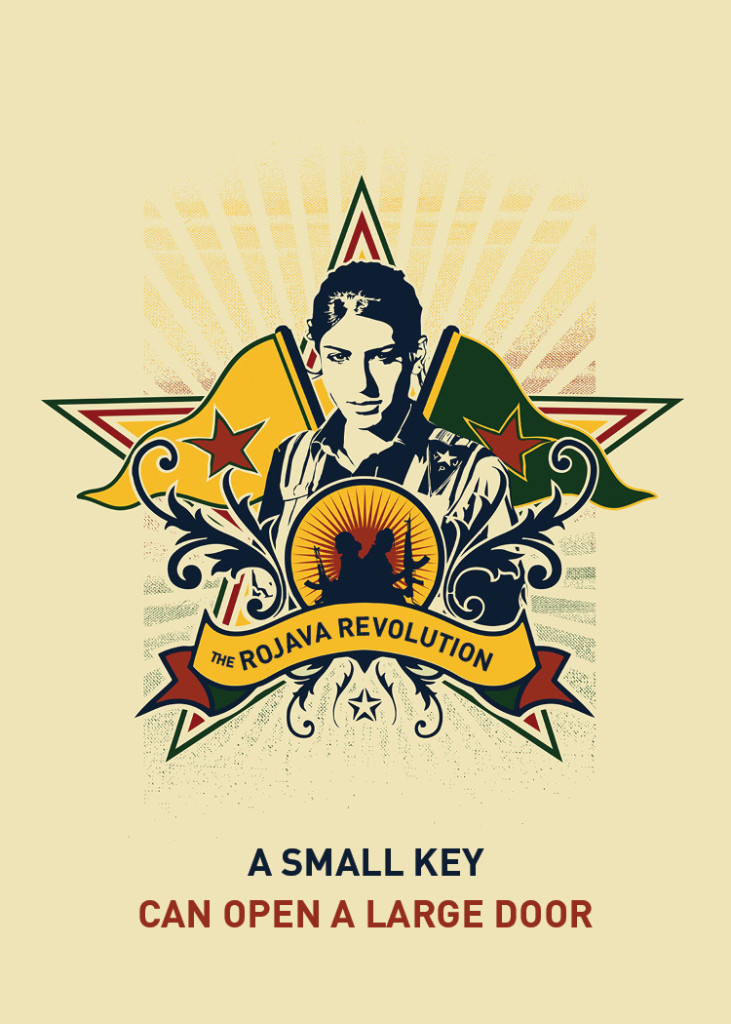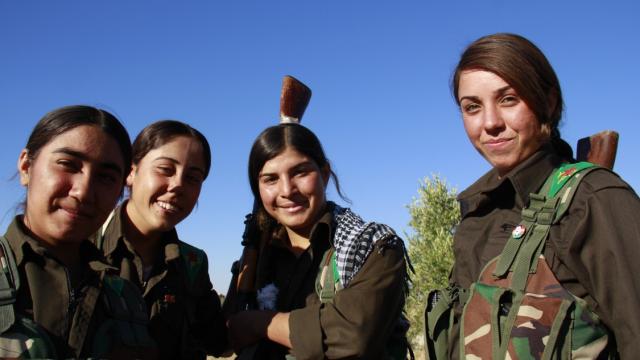This one small book explains the Inspiring Rojava Revolution
 Rojava’s social revolution deserves more global attention and solidarity. The Kurdish autonomous region in Northern Syria is a working experiment creating a society based on direct democracy, with women’s empowerment central in that model. It is being organized beyond and outside a state-centric capitalist system; mutual aid and cooperation are challenging structural exploitation and inequality. Remarkably, all of this emerges out of the Syrian crisis where the predominantly Kurdish Rojava experiment continues despite an existential fight against ISIS, the fascist and genocidal caliphate.
Rojava’s social revolution deserves more global attention and solidarity. The Kurdish autonomous region in Northern Syria is a working experiment creating a society based on direct democracy, with women’s empowerment central in that model. It is being organized beyond and outside a state-centric capitalist system; mutual aid and cooperation are challenging structural exploitation and inequality. Remarkably, all of this emerges out of the Syrian crisis where the predominantly Kurdish Rojava experiment continues despite an existential fight against ISIS, the fascist and genocidal caliphate.
How has all this happened? The book A Small Key Can Open A Large Door: The Rojava Revolution sheds light on the phenomenal story. Edited by a collective known as Strangers In A Tangled Wilderness, the book’s introduction gives a sharp, concise and thorough overview of Kurdish history before exploring Rojava through a series of essays, communiques, diary entries and other writings. Authored by those on the ground, including visitors to the region, the book is a fragmented composition whose different powerful voices thread tightly together.
At its core, A Small Key Can Open a Large Door puts in context why people in Rojava have rejected the nation state and Western capitalism after years of oppression from both. The Kurds come from autonomous roots. They lived mainly peacefully and autonomously as tribal clans inside the Ottoman Empire, from the 16th to the early 19th centuries. But from the 1800s onward, they experienced suppression at the hands of imperialist and capitalist forces. After World War I, the Kurdish diaspora spread across Turkey, Syria, Iraq and Iran. The book details how a common story emerges of repression, ethnic cleansing and genocide – often ignored and regularly supported by the Western powers.
“Over and over again, foreign powers intervene for a brief period of time, encouraging Kurdish rebellion just to withdraw support at crucial points and sacrificing the Kurds when they are no longer needed,” state the anonymously authors of the book, who suggest that this history, which repeated itself throughout the 20th century, forced the Kurds to realize they needed to fight for their own freedom.
To understand Rojava today, one must return to the founding of the Kurdish Workers Party, or PKK, in Turkey in 1978 as a seminal moment in that story. The party began as a militant Marxist organization fighting against the Turkish state, replete with bombing campaigns and armed insurgency. From 1984 to 2013, the PKK fought a never-ending guerrilla war.
However, the PKK found itself in crisis in 1999, which became another turning point for the movement. Its leader, Abdullah Ocalan, was captured by the Turkish military, and its tactics of suicide bombings and other attacks were no longer succeeding. People in the West were also confusing them with emerging Jihadist groups.
From prison, Ocalan led the PKK through a transformation, adopting the ideas of the Zapatistas in Chiapas and the work of Murray Bookchin, the anarchist thinker who advocates democratic confederalism; that is, a democratic system without a state. To commemorate Bookchin’s death, in 2006 the PKK council announced its aim to realize those ideas in practice.
In Syria’s ongoing civil war since 2011, President Bashar al-Assad’s forces steadily withdrew from controlling the north of the country. This gave the people of Rojava, who inhabit three geographically disconnected areas, a chance to reimagine their society. Inspired by the PKK’s shift to democratic confederalism, Rojava has turned what seemed to many to be political science fiction into reality.
A Small Key Can Open A Large Door explains the process by which Rojava created direct democracy governance without a state, built on local assemblies. Unlike other political systems, the popular base retains its power. People send representatives, who change on a revolving basis, to larger councils. But crucially, all decisions return back to the smaller councils for endorsement.
Also, instead of police, the Kurdish non-state keeps the peace with Asayish (security in Turkish). Both these forces and the militias fighting against ISIS are answerable to the local assemblies. In one fascinating segment, the book describes how the Kurdish region has used power-to-the-people principles to reimagine an economic system beyond capitalism. It also emphasizes that Rojava isn’t only a Kurdish non-state solution – that direct democracy is open to all religions and races, and the Rojava regions are showing this through their embrace of thousands of refugees displaced from Syria.
 Feminism, too, is central within the Rojava revolution. All administrative duties are co-chaired by men and women; all councils must have over 40% of each sex represented. There are female-only Asayish-J, (non-statist police) to deal with crimes against females and children as well as hate crimes. There are also all-female safe houses in each town.
Feminism, too, is central within the Rojava revolution. All administrative duties are co-chaired by men and women; all councils must have over 40% of each sex represented. There are female-only Asayish-J, (non-statist police) to deal with crimes against females and children as well as hate crimes. There are also all-female safe houses in each town.
On the battlefield, women-only and co-ed fighting units are another feature of life in Rojava. As the book explains, the Kurdish women are fighting the embodiment of women’s oppression in the form of ISIS: a group that uses rape and sells women into sex slavery. But women in Rojava aren’t only assuming political, policing and military responsibilities; they’re also challenging sexism, fighting against forced marriage, domestic abuse and the oppression of women across all aspects of Rojava society. The Rojava Revolution is first and foremost a revolution for women by women.
The book offers a bridge for people in the West to understand and appreciate what democratic revolution actually means in the 21st century. Western media have been criticized for ignoring on the whole the social revolution that is sweeping Rojava, and instead focused on the glamour of the region’s fighting women. A Small Key Can Open A Large Door breaks down barriers and dispels myths as it paints an accurate, stirring portrait of the life Rojava’s people are actively imagining and creating. For anyone who wonders whether another world is possible, this book is essential reading.

Fair play to them “does the last man standing” still believe in the Capitalist society,capitalism is/will be the ruination of the world,does anyone ever ask the question why are we invading/destroying other countries? the usual tripe is that it is in our interests,does that answer include the 99% of the dis-enfranchised,I very much doubt it.Viva Rojava.
Maybe the mainstream media ignoring them is a good thing. As soon as they become well known, the CIA+its enablers will dispatch saboteurs. Don’t turn them into heroes! Keep it low key. Them flying under the radar is a big good thing.
Do the authors support the creation of a future Kurdistan, or would that ruin the experiment, and would return them to a nation-state?
An interesting article about a book which I will read. Was just discussing this morning, the topic of local groups of ordinary citizens forming “councils” to actively and peacefully take back what belongs to us all. And to take it back from the existing local “authorities” who seem to be engaged in the capitalist sell-off of public property (certainly the case here, in East Renfrewshire).
Can the Rojava model be replicated in regressively conservative states (like the UK for instance)? I’m sure it can but will require good minds and bodies to achieve.
Off topic: I read an article this morning entitled “Frack or Freeze” which attempted to favour the commencement of Fracking in Scotland. This was described (in the article) as being necessary to bring down fuel bills (as if Ineos would reduce it’s desire for maximum profits for the common good!) and to replace existing fossil fuels with what the author purported was a cleaner method of electricity generation.
The article has since disappeared from Bella for some reason. I am not a supporter of fracking (and have demonstrated and campaigned to oppose it) but wondered what may have become of the article. Did Bella publish it out of a sense of balanced reporting? Or was the website hacked? Can someone please explain?
Anent Mr Anderson’s comment on the lost fracking article: I too was puzzled by its inclusion, have tried to return to it in case I’d been dreaming (actually a nightmare) and have similarly failed to find it again. It struck me at the time as something written by an industry lobbyist.
Thankyou Neil Anderson, thankyou Astragael ~ it’s been hard to restrain my anger at frustration at not being able to comment on “Frack or Freeze”… an appalling article full of misinformation & downright lies. Bella Caledonia is undoubtedly a major target for hacking and infiltration ~ there have been toxic articles before, not obvious, clothed in outwardly friendly terms.
Commonweal to my mind has similar ideals,people just do not understand the power that they have.
A docomentary on this is currently being aired on RT (Russia Today).